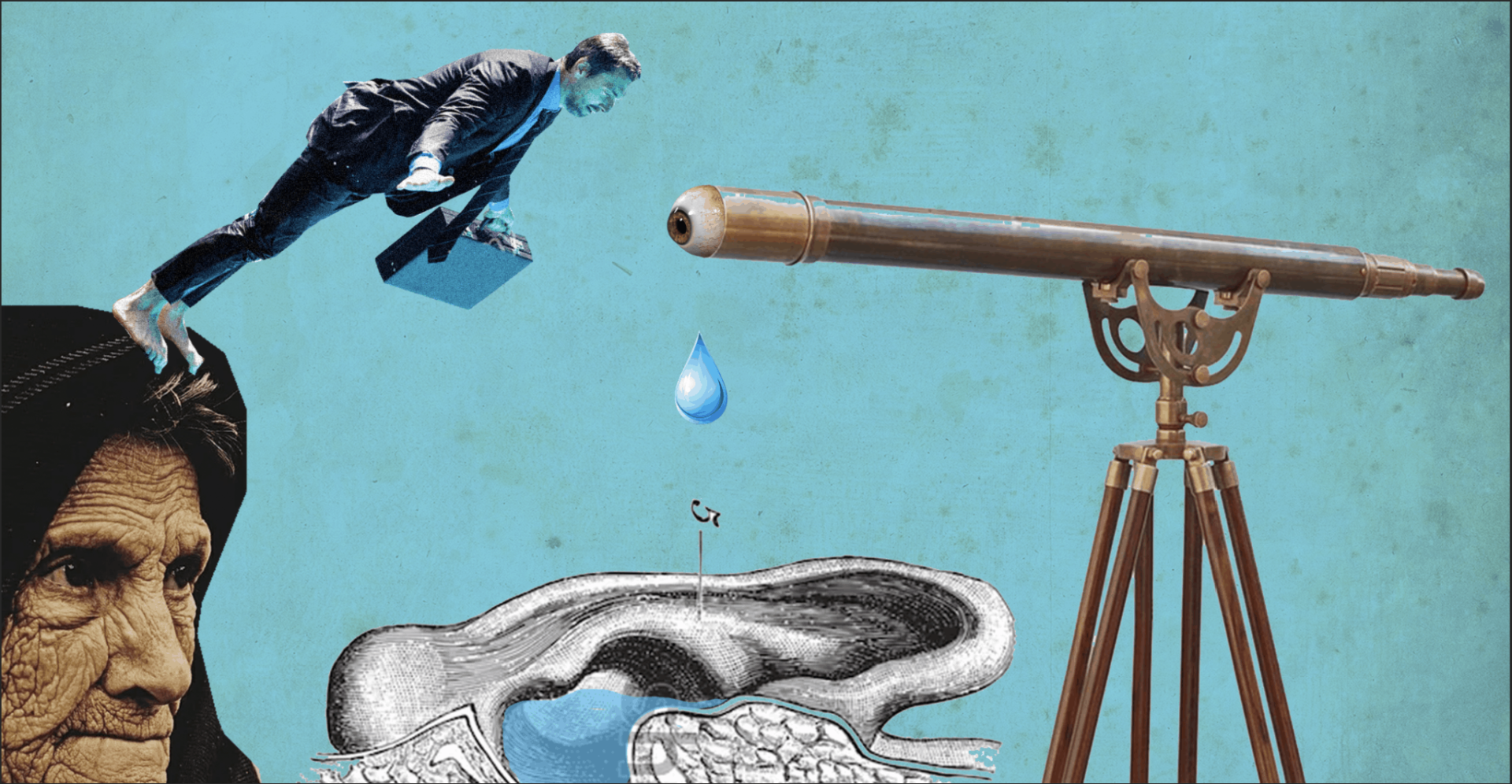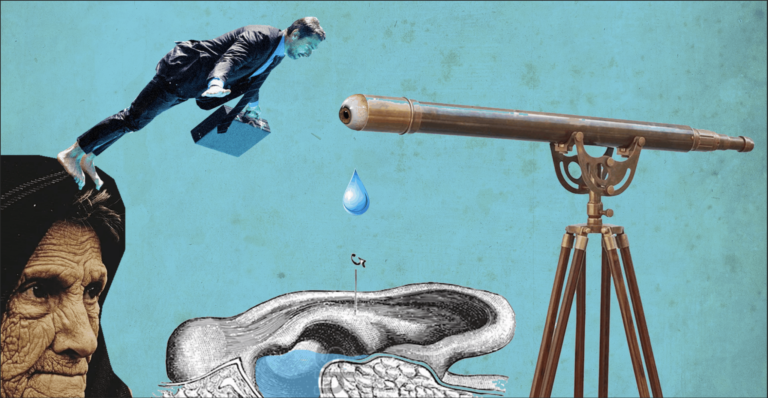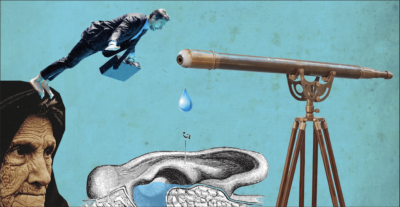Daniel Flis (OKO.Press/VSquare)
Graphics: Lenka Matoušková 2020-05-06
Daniel Flis (OKO.Press/VSquare)
Graphics: Lenka Matoušková 2020-05-06
Ladislav Vydra is a pensioner from Prague. After an eye surgery, his retina fell apart and he all but lost his eyesight. Doctors gave him no prospects for improvement. Andrzej, a man from Poland, has his hearing impaired but does not want to use hearing aid yet. Both of them trusted ads for miraculous products, which in reality were part of an international scam.
When Ladislav’s wife Ivana saw an advertisement in a Czech tabloid for “binocular” glasses, which promised to heal her husband’s eyesight, the couple started to entertain hope. But then the product, which had been marketed as a long-hidden army secret, arrived.
“It’s complete rubbish, it doesn’t work at all. It’s only good for kids to play with,” Mrs Vydrová says about the cheap-looking plastic glasses, which were made in China and for which the elderly couple paid EUR 35.
“There’s no optical aid that can have a retroactive healing effect on the eye. It’s nonsense,” says Jitka Řehořová, an ophthalmologist at a Prague’s hospital who assessed the glasses’ quality at the request of the Czech Television, which originally broke the news. “It’s a clear fake,” she added.
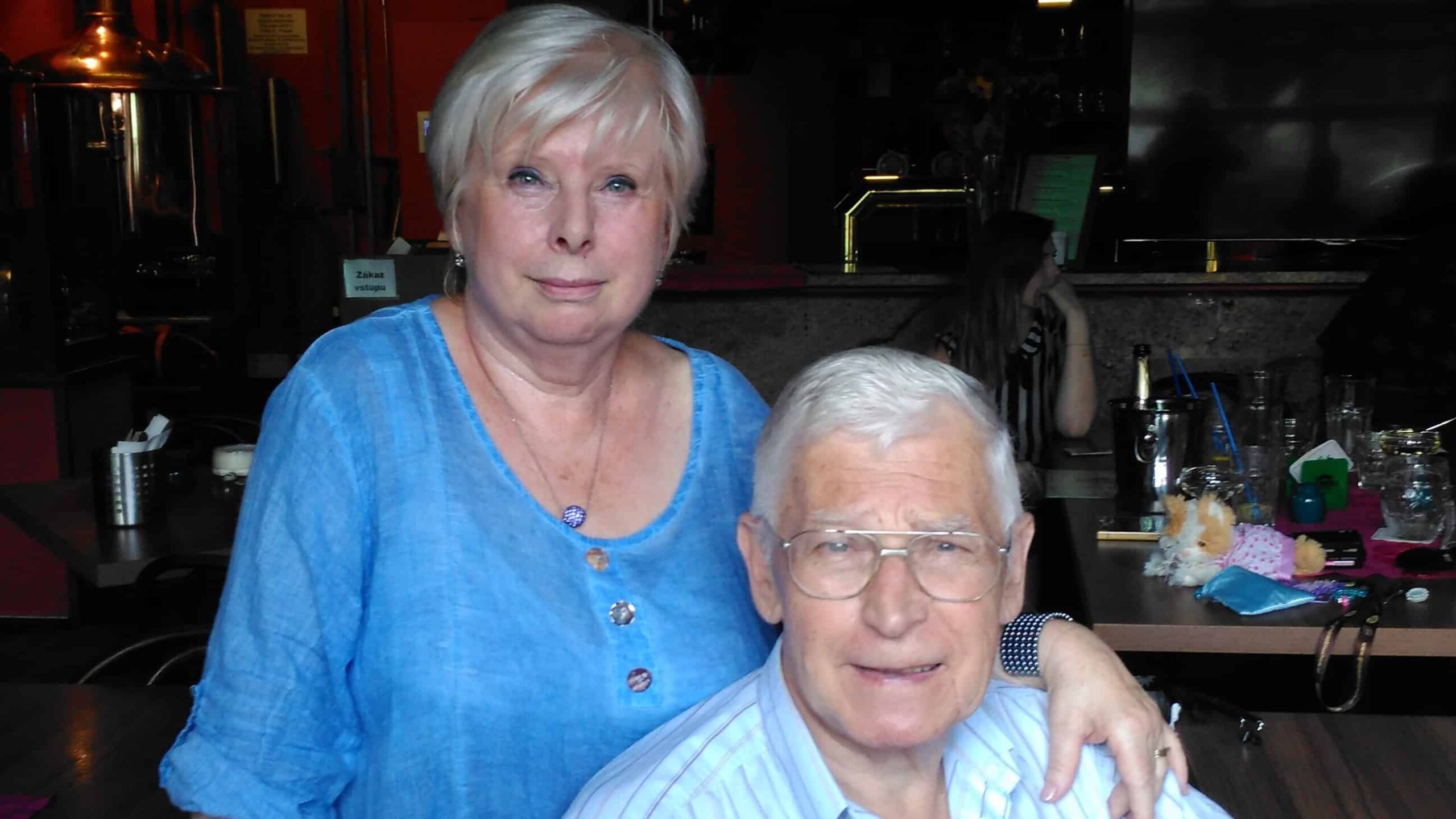
Mrs and Mr Vydrovi; Credit: Mrs Vydrova´s archive
No different was a doctor’s opinion on ear drops purchased by Andrzej. He hoped he could live without a hearing aid after the drops treatment. “His laryngologist laughed at him and said there was no oil that can treat his hearing problems. Such damage is irreversible. We became victims of a fraud,” Elżbieta, Andrzej’s wife, said to a Polish news outlet in 2017.
Andrzej and Ladislav are by no means the only people who have been deceived by a retail platform called Discount Club. There are similar stories of other pensioners who purchased “biomagnetic” insoles to ease the pain in their legs, or ear drops to heal impaired hearing, only to realize later they were cheated.
The sale of fake medical products to the elderly, the social group most vulnerable to this kind of fraud, is not limited to Czechia and Poland. Investigace.cz and Fundacja Reporterów have found that the nature of the scam is characteristic of an organized crime operation, which runs across four continents and has thousands of victims in at least ten EU countries, as well as Panama, the Comoros, and Singapore.
Fall for the Bait
“Do you no longer want to rely on others and be ashamed every time you need to beg for help while reading bills, recipes, or labels on drugs?” “It’s a multifunctional product: binoculars, magnifier and glasses in one!” ads in a Czech tabloid magazine exclaim. Similar ads have run in at least three other tabloids since at least 2018.
Andrzej from Poland, who bought the fake ear drops, was deceived by an online ad. It was camouflaged as an article from a medical website and quoted Feliks Jaworski, a “specialist in molecular biology, nominated for the Nobel Prize” insisting that the product would allow you to “enjoy 100% hearing performance in 28 days. Without any hearing aid!”
But as Polish journalists discovered, there is no scientist by this name. Moreover, another photo of the “biologist” appeared in a different ad in which he recommended “hearing improving oil”, only this time under the name Romuald Kosiński. The same face appeared in Hungarian tabloids under the name Richárd Vagyok, and in another Czech tabloid as Jaromir Kosinský.
“These fraudsters aim at pensioners, of course,” says Gerta Mazalová, the chairwoman of the Association of Consumers’ Protection, which is based in the Czech Republic and helps defend consumer rights. “They are usually the most vulnerable group because they’re often lonely, ill, handicapped and trustful. On top of that, they have a fixed pension so there’s assurance that their financial means will be available, in contrast to young people who aren’t able to pay debts in case they lose their job,” she added.
Data from the Czech Trade Inspection Authority testify to the general trend that scammers in the business of preying on the elderly have moved from in-person sale of fraudulent products — such as overpriced kitchen pots — to selling these products on the Internet. The number of complaints about fraudulent in-person sales fell from over 400 in 2012 to only 13 in 2019. According to Jiří Fröhlich, the state agency’s spokesperson, there has been an enormous growth in complaints about internet-based sellers, reaching 5641 documented complaints in 2019.
Lady from Poland

AZ Tower in Brno, the alleged seat of Direct Group in the Czech Republic; Source: Wikimedia
The Prague City Administration, which asserts authority over ads printed by entities on its territory, demanded the tabloids take the fraudulent ads down. “According to the publishing houses, the ads were placed by Direct Group S.A., seated in Panama,” Eva Nováková, the City Administration’s lawyer, wrote to investigace.cz.
Despite efficiently banning the deceiving ads, the Prague’s City Administration could not determine whether Direct Group was the real entity, behind the content, or just an intermediary for the group behind the fake products.
While Direct Group is officially seated in Panama, since 2018 it has been registered at a correspondent address in a skyscraper in Brno, the second largest city in the Czech Republic. In late 2019 we tried to get in touch with the company. A receptionist of Altaxo, which sells ready-made companies with addresses at the skyscraper, said she couldn’t put us through to the staff of Direct Group, and hung up when our reporter identified himself as a journalist.
We gave it another try in April 2020. This time the reporter posed as a client trying to return goods to Direct Group. An employee of Altaxo confirmed that Direct Group only pays for a virtual address and has no staff in the building. “I don’t know if we can get in touch with them, we only handle their post,” the Altaxo employee said, adding that she couldn’t give us their email as “it’s internal information.” But she promised that “a lady from Poland” would get in touch. No such lady did.
Who is “the lady from Poland” and what does she have to do with the Panamanian company? While trying to establish the missing links, we indulged in an investigation that untangled a network of shell companies scattered around the world.
Heaven of Secrets
Panama, where Direct Group S.A. is registered, is a tax haven. Besides tax optimization, it also offers secrecy — one can learn only very little about Panamanian companies from the local registry. Though it reveals the names of company directors, it conceals the identity of real owners. In shell companies, which the local law firms help set up, directors are just proxies. There is no way to find out who really stands behind and profits from a company until an insider leaks the documents.
Direct Group had their own attorneys at law in Panama — Quijano and Associates — who have helped the real beneficiaries to remain hidden. However, in cooperation with OCCRP (Organized Crime and Corruption Reporting Project) Investigative Dashboard, an online investigation platform for journalists, we were able to establish the owner of Direct Group S.A.
Meet Michał Andrzej Brzostowski, a 35-year-old businessman, from a small village near Warsaw
I Affiliate, Therefore I Am
We managed to get on his trail thanks to thorough research in international company databases. It showed that Direct Group S.A. in Panama belongs to B E N E F I T PTE LTD., a company registered in Singapore in 2016. A Polish national, Michał Brzostowski, was mentioned as its beneficial owner, along with Chua Cheng Jin from Singapore.
B E N E F I T trails led also to Malta and Estonia. Official documents in those two countries confirmed that Brzostowski owns the Singapore company and thus also Direct Group in Panama, the company behind the fraudulent advertising.
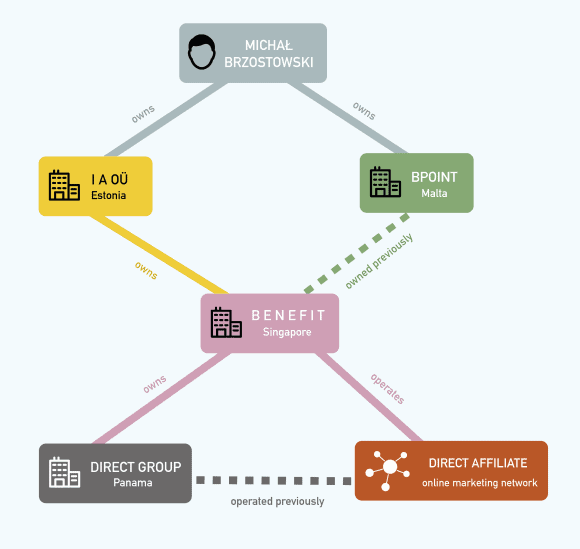 B E N E F I T’s website mentions that one of the most important moments in its history was the acquisition of Direct Affiliate in 2017, the “industry’s most effective affiliate network”, which offers ads for internet publishers (“affiliates”), such as bloggers.
B E N E F I T’s website mentions that one of the most important moments in its history was the acquisition of Direct Affiliate in 2017, the “industry’s most effective affiliate network”, which offers ads for internet publishers (“affiliates”), such as bloggers.
Our reporter registered on the Direct Affiliate’s website as a “publisher”, using a fake name and phone number, to find out what that blusterous slogan actually means. It turned out the platform offers astonishing profits to its “affiliates” for publishing online ads on dozens of products, including fake glasses and ear drops like the ones Mrs Vydrová and Andrzej purchased.
If a product is purchased because of an affiliate’s ad, they get at least 75% of the profits accrued from its placement. The more you sell, the higher the commission, the site further explains. The offered products cost from EUR 11 to 44, while the prices slightly differ from country to country. In the Czech Republic, the fake ear drops were offered for EUR 17, which would make an affiliate profiting EUR 12.75 from each bottle.
While the so-called affiliate marketing is, in general, a legitimate type of performance-based business which rewards an affiliate for each visitor or customer brought by the affiliate’s own efforts, the fairy-tailish profits, deceiving ads and fake products offered by Direct Affiliate make its legality questionable.
Direct Affiliate’s website does not reveal the company’s owners, nor its address or phone number. The only possible way to contact the firm is via an online form. However, there is a tiny note on the website that says the page is operated by B E N E F I T, Brzostowski’s company in Singapore.
Moreover, a snapshot from May 2015, saved on an online archiving service, disclosed that the former operator of the Direct Affiliate website was Direct Group — Brzostowski’s company in Panama, responsible for the deceitful ads in the Czech Republic. The Panamanian company’s contact phone number at that time had a Polish prefix +48. In fact, the directaffiliate.com domain’s registrant was Michał Brzostowski himself.
Besides the personal identity of the registrant, the domain data also disclosed an address in Kanie, a small village 20 kilometers southwest from Warsaw. The reporter visited the site on March 12th to confront Brzostowski.
I am Confused
Despite the sunny weekend afternoon, Kanie, a village of around two thousand inhabitants, was completely deserted due to a strict coronavirus-related lockdown.
When our reporter arrived at the address, a short man around 30 years of age dressed in a grey sports sweatshirt emerged from the gate.
He didn’t introduce himself, and when asked if Michał Brzostowski lived in this house, replied: “I don’t know”. When our reporter left a card, he was assured that Brzostowski would reach out to him. Later a neighbour told the reporter he hadn’t seen Michał Brzostowski for years, but added that his family still lived in the neighbouring house.
Reporters sent questions about his companies to Brzostowski’s several email addresses, asking about his role in putting out the deceiving ads and fake products. In his reply, he didn’t deny that he was the owner of Direct Group from Panama and other mentioned companies, but also didn’t answer any other questions.
“Please provide me with a precise law, that would oblige me as a private individual to be answering your questions,” he wrote us. We referred him to Article 4 of Polish press law, which requires local entrepreneurs to provide media outlets with information about their activities with some exceptions for privacy or secrecy issues. “I have to say I am confused, since I have no company in Poland,” he responded.
One of the many questions Brzostowski did not answer was if he was the owner of the Global Group, another company we discovered while researching the online scam. Global Group is an alleged seller of fake goods that works with the retail platform Discount Club in the Czech Republic.
Union of Komorów
“Global Group” is mentioned on the leaflets attached to the fake products. Eva Nováková, Head of Department of Trade Licence and Civil Law Issues at Prague’s City Administration, admits that one of the companies confirmed “that some advertisement [in the Czech Republic] was ordered by the Global Group, [which is] based in the Union of Comoros.”
However, the domain of a website it administers was registered in 2018 by a Poland-based domain provider aftermarket.pl — the very same provider Brzostowski used to re-register the website of Direct Affiliate in 2019.
Surprisingly, the exotic destination behind the seat of Global Group is not featured in any international database that includes companies of the Comoros.
When the reporter travelled by train from Warsaw to confront the Polish businessman, he realized that two train stops before Kanie, the village where Brzostowski possibly resides or used to operate from, is the town of Komorów. Interestingly, the “Union of Comoros” is translated as “Związek Komorów” in Polish.
Was a wordplay with the islands and the town of Komorów used to distract authorities from identifying a real person behind the deceiving ads? Could it be a fake firm with no official registration? Indeed, it wouldn’t be the only one in this story.
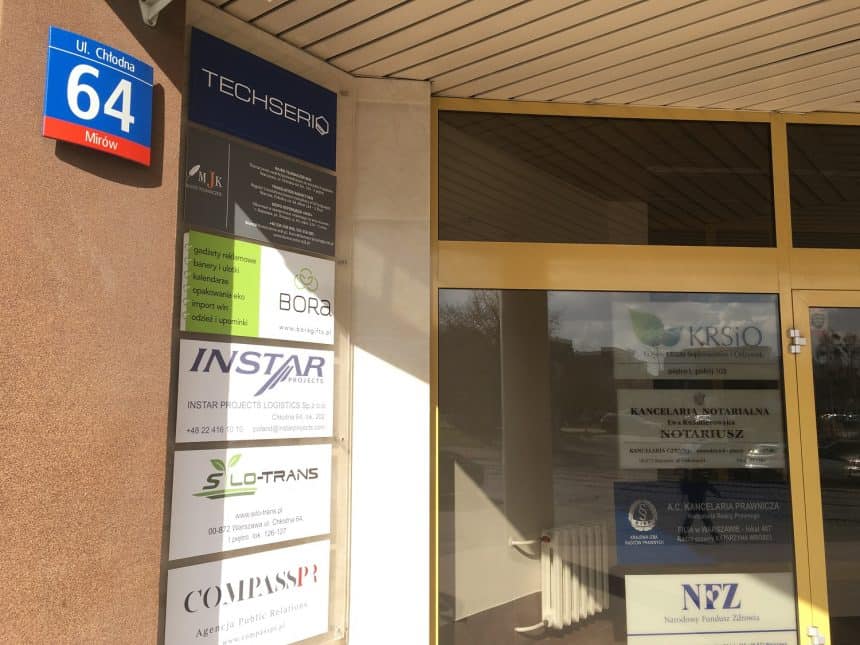
Chlodna 64, Warszaw – the alleged seat of Reverse Logistics.; Credit: Daniel Flis
Please Hold the Line
Global Group instructed the cheated Czech clients to return faulty goods to a Warsaw-based company Reverse Logistics. Its alleged seat also served as a correspondent address for Global Group, according to the leaflets attached to fake medical products.
As reporters found out, Reverse Logistics has never been officially registered in the Polish business registries. It is a made-up firm with only a virtual address, which enabled the fraudsters to pick up the post, in this case the faulty products. When the reporter visited the premises in the Polish capital at Chłodna 64, the office was locked. The security staff at the door disclosed that some people still enter with a key.
The reporter used the return of goods as a front to understand how Reverse Logistics fits into the whole scheme.
Helpline
Reporters of investigace.cz tried to contact the retail platform Discount Club at six different phone numbers mentioned in various print advertisements. After a number of unsuccessful attempts, they managed to reach a phone bot which did not allow direct contact with a human. However, the next day, an operator called back.
“Who ordered the product?” he asked in Slovak after the reporter — on behalf of a real victim — sought to get money back for the fraudulent product. “What’s the reason for the return?” asked the operator after cross-referencing the buyer’s identity with the list of clients.
“It’s trash, it doesn’t work. Do clients return these products often?” our reporter asked.
“I’d say half of the customers are happy with it, half not. I can’t tell you precise statistics though, we don’t have them,” the operator replied. “We only communicate with the clients, there’s another department responsible for the sale,” he added.
The Slovak man behind the phone explained that Discount Club is a retail platform which associates several vendors and enables communication with clients. He said he only represents Global Help Info, the customer service center which facilitates communication regarding the return of goods.
“But who is the seller of the goods?,” we asked.
“You know it’s difficult to say, but I think that the product is from the United States, and is manufactured in China”.
Although the companies and addresses printed on the packaging of “Binocular Glasses Zoomies” confirm his words, the allegedly Miami-based Products LLC does not feature in Florida’s official company registry.
“Currently, the reclaimed products shouldn’t be sent to Poland, the rules have changed. That address doesn’t work anymore,” said the operator at the helpline, which facilitates the return of goods. “There’s a problem with the producer. It’s very complicated because it’s international. You can write in the online form the product didn’t work, they won’t demand sending the product itself. You just need to fill out your bank account details,” explained the operator.
According to the victims, the reporters were unusually lucky: many elderly clients were unable to reach a human operator.
“When I reached the customers’ line, I was told to wait. The phone bot said I was 165th in line,” laughs Mrs Vydrova, who bought the “army glasses” for her husband.
Yet after the communication with the customer service switched from phone to emails, the reporter who pretended to be a victim, was instructed to “return intact products” to Reverse Logistics. Over the course of our investigation, its correspondent address changed from Poland, in late 2019, to addresses in Lithuania, Belgium and Croatia in April 2020.
Honest Coordinator
Though the situation appears to be an endless odyssey for cheated customers, claiming back money from the fake products turns out to be easy and efficient for professionals. “In cooperation with our Polish partners, we have a 100 percent success rate,” says Ondřej Tichota, the spokesperson of the Czech branch of the European Consumer Centre (ECC), which gives advice on consumer rights in the EU and facilitates extrajudicial resolution of cross-border disputes between consumers and traders for free.
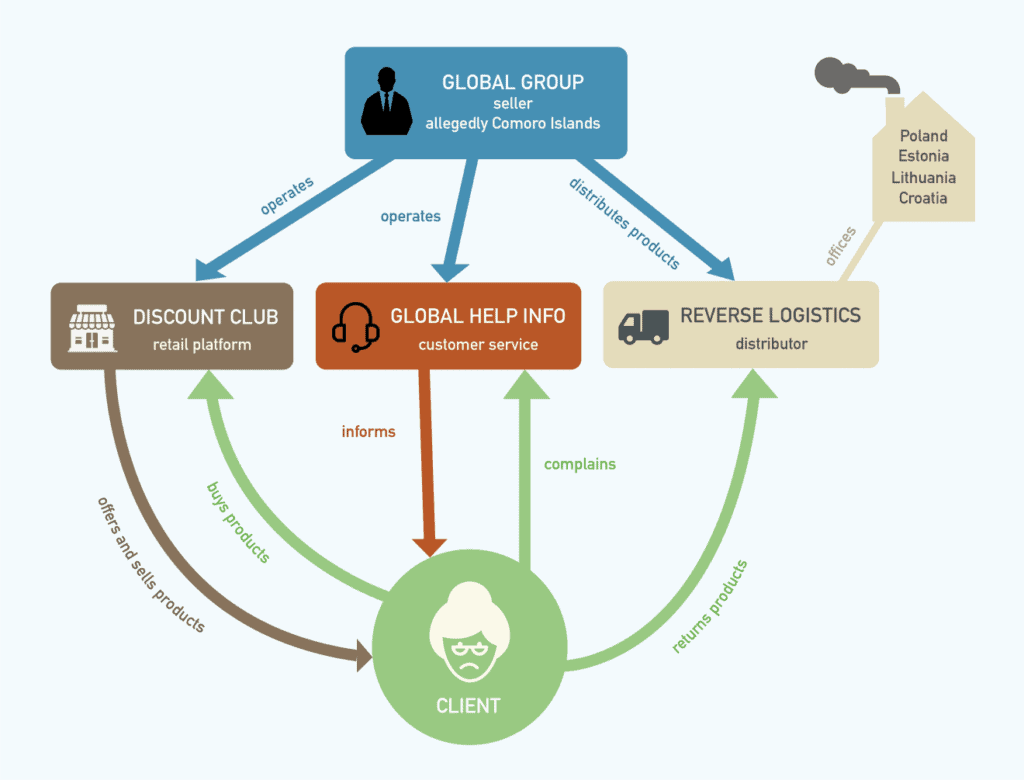
“Our Polish colleagues contacted Reverse Logistics, which was featured as a distributor. The company gives the money back to the customer, even though it’s not the seller itself,” she explained. She says that since 2018, there have been over 170 consumers’ complaints, two-thirds of the total amount being claimed by Czech consumers.
“When I received the first complaint, about five years ago, I decided to help,” Karol Muż, a coordinator at the Polish ECC branch, says.
“I saw that the Global Group had a representative in Warsaw, the Reverse Logistics. I found its several emails on online fora, sent a letter and succeeded [in getting the money back],” he describes. He says that he typically gets a reply from the firm after 2-3 days, with the complaints being accepted.
“But if they ignored my emails, I wouldn’t have any instruments to put pressure on them,” Muż points out. He adds that Reverse Logistics’ staff continues to ignore one question: where should the clients send the reclaimed products back? “They only ask for an account and return the money. This indicates that these products really are worthless.”
Out of Reach
State agencies, which inspect the legitimacy of businesses and quality of medical products, are aware of the ongoing scam. Why can’t they tackle the issue?
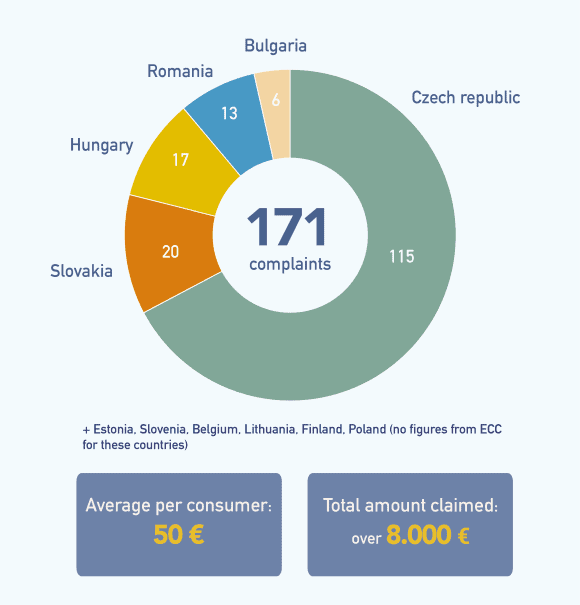 Jiří Fröhlich, the spokesperson of the Czech Trade Inspection Authority (CTIA), a governmental institution under the Ministry of Industry and Trade, says they are not authorized to inspect the businesses “involving dietary supplements and medical products.” CTIA, moreover, wouldn’t have the authority to sanction unfair trading practises of Global Group as the company resides — at least formally — outside the European Union.
Jiří Fröhlich, the spokesperson of the Czech Trade Inspection Authority (CTIA), a governmental institution under the Ministry of Industry and Trade, says they are not authorized to inspect the businesses “involving dietary supplements and medical products.” CTIA, moreover, wouldn’t have the authority to sanction unfair trading practises of Global Group as the company resides — at least formally — outside the European Union.
Supervision over medical products in the Czech Republic falls under the authority of the State Institute for Drug Control (SIDC), which checks if a potential medical product meets the law regarding production, import, distribution and sale on the market.
“The hearing aid Audisin, ear drops Biostenix and glasses Zoomies do not correspond with the legal definition of a medical product,” says Barbora Peterová, the spokesperson of SIDC. In fact, SIDC warned the public on its website against buying the products offered by Discount Club. It urged consumers to “be vigilant and not to trust advertisements that may be deceiving as it claims that a product has effects for which there is no appropriate evidence.”
“In case of fraudulent sale of a product, which poses as a medical device but doesn’t meet its legal definition, a complaint is sent to relevant bodies,” Peterová says regarding how the supervisory body is able to sanction such fraudsters. “SIDC, however, doesn’t have any information about how these bodies process a complaint.”
The Ministry of Health’s standpoint is more clear-cut. “These products are sold illegally in the Czech Republic. The seller has broken several provisions of the law. There’s reasonable suspicion that the seller committed the crime of fraud. We filed a criminal complaint to the prosecutor’s office,” Radek Policar, the Deputy Minister for Legislation and Law, opined for the public broadcaster.
The experts in customer rights protection remain skeptical, however, given the difficulty of proving intention to commit a crime, at which point police usually suspend investigations. “We have a real issue with law enforceability,” Gerta Mazalová, the chairwoman of Association of Consumers’ Protection based in the Czech Republic says. “The courts are expensive and they go on for years — that’s a hamper for the elderly.”
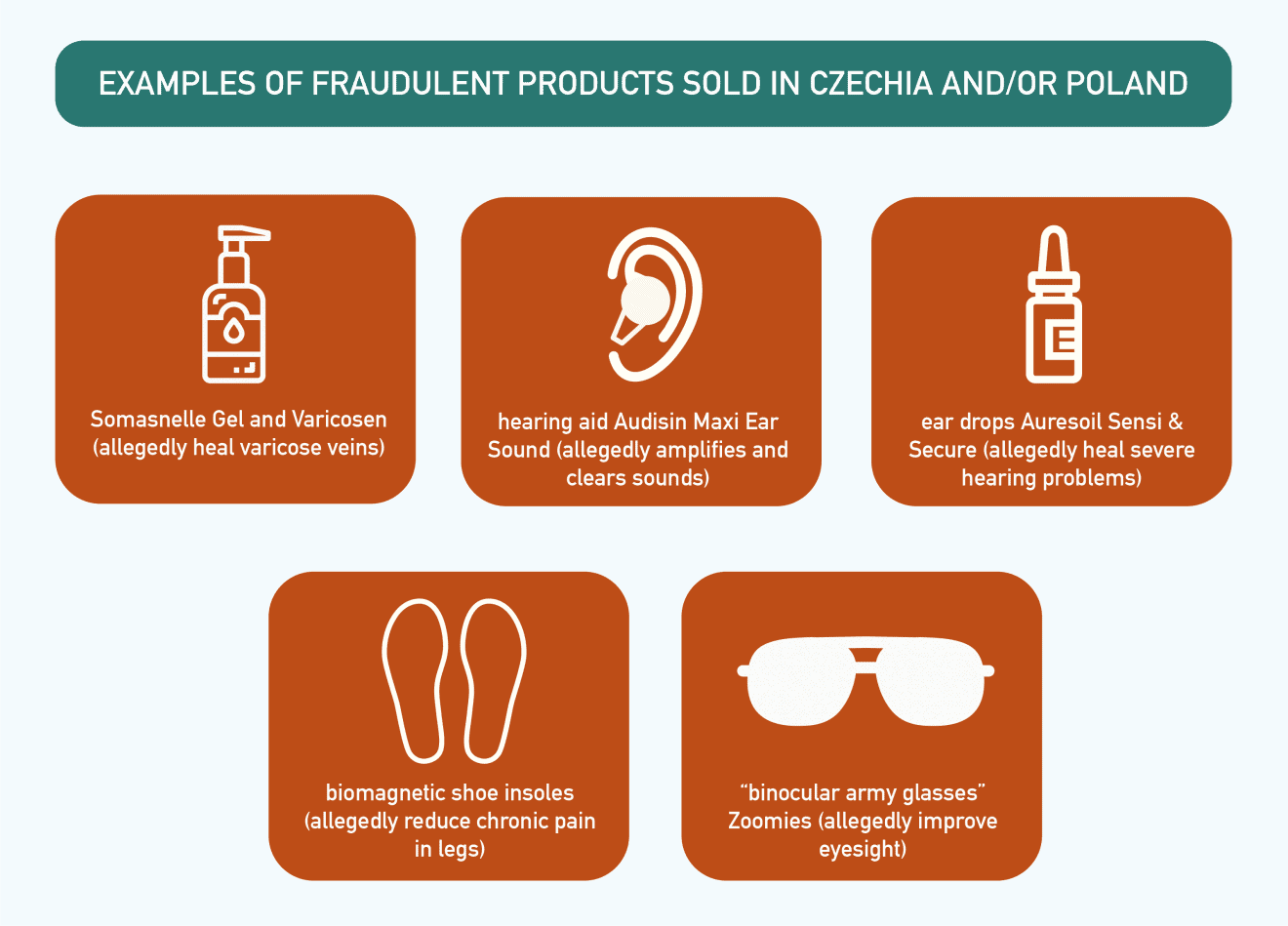
In Poland, dishonest advertisers may be financially punished by the Office of Competition and Consumer Protection (OCCP). “Using such fraudulent ads is like stealing a wallet on the street. However, we cannot send arrest warrants to dishonest entrepreneurs. When they operate internationally, we notify the police or prosecutor’s office,” says Małgorzata Cieloch, a spokesperson for OCCP.
In March 2019 OCCP notified the National Prosecutor’s Office about the deceitful advertisement of fake ear drops. It also notified the website’s host of the misleading ad, which led to the website shutting down.
However, a prosecutor from Warsaw’s Wola district decided to stop the investigation into the case. “The essence of crime of fraud is to mislead. (…) The usage of excessive advertising, even if it contains information inconsistent with reality, is not misleading. (…) Because it is assumed that the essence of advertising (…) is a specific way of providing information, a little exaggerated in relation to the actual state of affairs,” the prosecutor wrote in explanation.
Scam must go on
In December 2019, Direct Affiliate sent an internal directive to its “affiliates” that the offer of medical products and dietary supplements should be immediately put on hold in the Polish market. The company did not explain to the “affiliates” — which included our reporter — its reasoning behind the sudden halt.
In March, Prague’s City Administration confirmed to the reporters that its staff have not detected new cases of the sale of fake medical products, nor advertisements appearing to have been issued by Direct Group S.A. based in Panama.
Most of the addressed experts and national authorities in the Czech Republic and Poland, however, agree, that crooks are marvellously adaptable and always one step ahead of the law, supervisory bodies,or police.
“In general, it’s an issue of anonymity on the Internet, which is related to the opportunities to commit crimes on a global scale. Potential legislative amendments would need to aim in this direction, the consequences of which, however, could include restrictions on freedom and the possible tracking of one’s activities online,” Tichota says.
“Those who want to do illegal business have transformed into using risky and fraudulent websites,” says Fröhlich from Czech Trade Inspection, which oversees a list of illegal e-shops. Since the coronavirus pandemic burst onto the scene, the size of this list has dramatically surged.
This text was financially supported by GACC (The Global Anti-Corruption Consortium) aimed at the Visegrad countries. Member centers Átlátszo and Direkt36 from Hungary, Fundacja Reporterów from Poland, Ján Kuciak Investigative Center from Slovakia and investigace.cz from the Czech Republic are working on the project.

